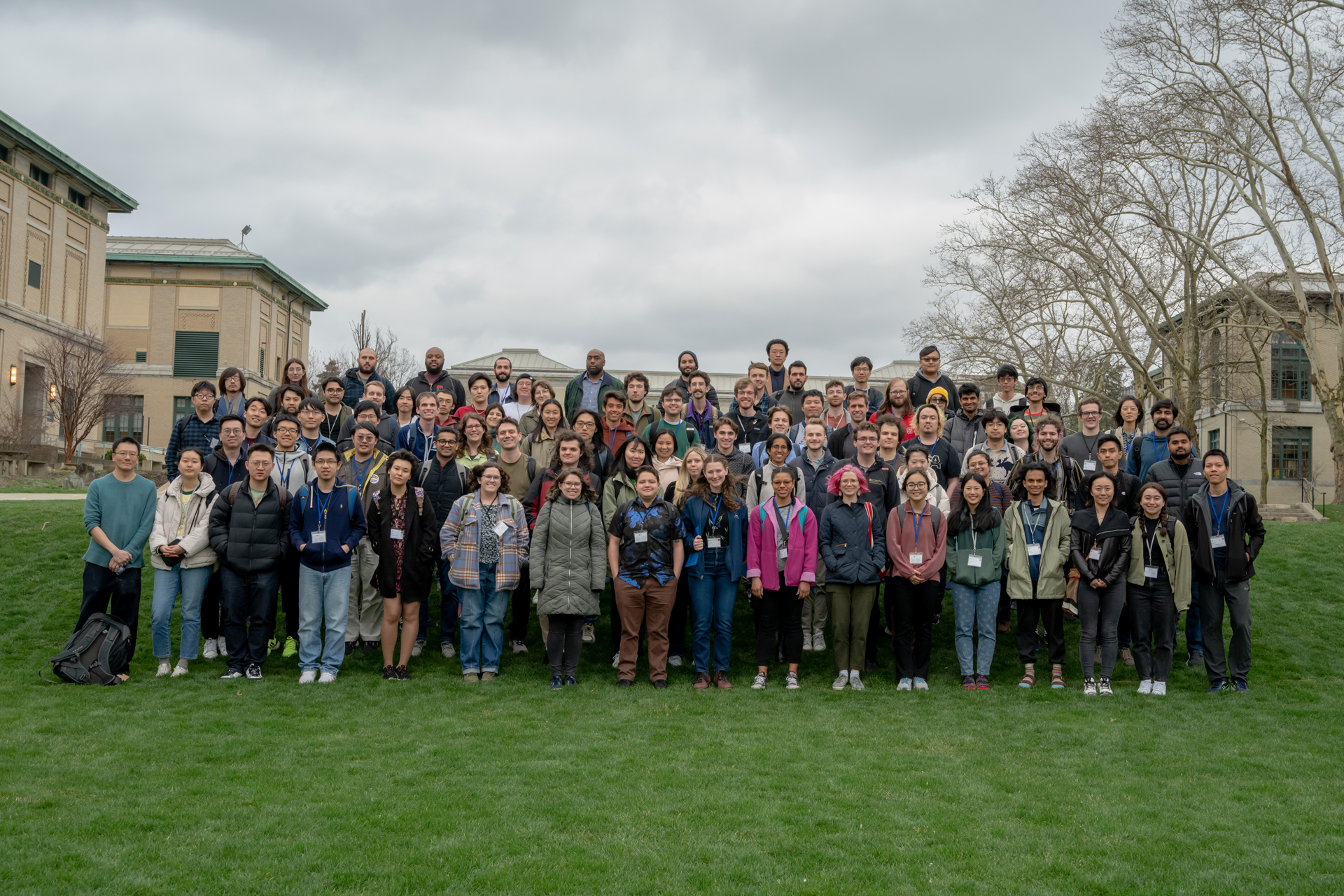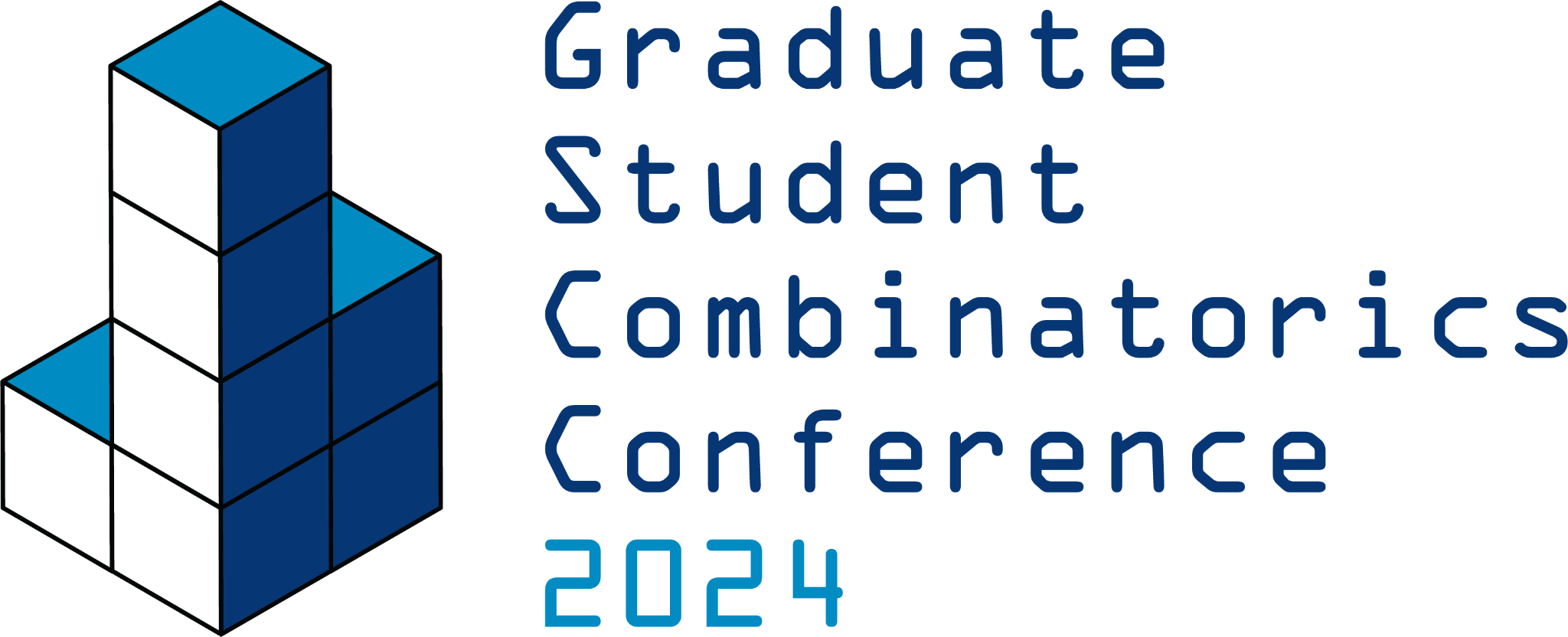Mathematical Sciences Conference Finds the Right Combination for Success
Four plenaries, student speakers, socializing and a few riddles engaged participants at the Graduate Student Combinatorics Conference 2024
By Ann Lyon Ritchie
Media Inquiries- Interim Director of Communications, MCS
- 412-268-9982
Carnegie Mellon University Associate Professor Michael Young considers ways his research could be applied to improve efficiency in an electrical power grid. Using techniques from theoretical graph theory his research could help determine more strategic placements of voltage measuring units on the grid.
Young’s research has applications in combinatorics, an area of mathematics about counting and combining, where researchers seek out how many different combinations of something could be possible and the probability that certain combinations could occur.
He shared his work with graduate students in mathematics who convened at Carnegie Mellon for the 19th Graduate Student Combinatorics Conference (GSCC) March 15-17.
“GSCC is a great conference for rising combinatorialists,” Young said. “It was a privilege to be invited to speak and I’m immensely proud of our students for efforts they put into organizing the conference and showcasing Carnegie Mellon. Participating in this conference for graduate students is not just about spotlighting their amazing research, it’s also about nurturing a vibrant community that will shape the future of discrete mathematics.”
GSCC 2024 is the first time the conference took place at Carnegie Mellon, largely due to Tolson Bell leading the host application process after attending GSCC 2022 virtually. Fellow doctoral students Olha Silina and Eric Wang joined him as co-organizers.
“One of the things we called attention to in the host application was the strength of CMU in probabilistic combinatorics,” Bell said. “We have seven to nine active professors who primarily study combinatorics, a well-attended weekly combinatorics seminar and an active community of Ph.D. students and postdocs.”
CMU’s Algorithms, Combinatorics and Optimization (ACO) is an interdisciplinary Ph.D. program administered jointly by the Operations Research group in the Tepper School of Business, the Computer Science Department in the School of Computer Science and the Department of Mathematical Sciences in the Mellon College of Science.
Young was among four GSCC plenary speakers, who included Jane (Pu) Gao from the University of Waterloo, Thomas Lam from the University of Michigan and Igor Pak from University of California, Los Angeles.

Graduate students in mathematics convened at Carnegie Mellon University for the 19th Graduate Student Combinatorics Conference in March.
“I was always very impressed by CMU’s ACO program as a group that is collaborating closely in research and supervising graduate students,” Gao said.
During her presentation, Gao initiated a discussion with the 100-prisoner problem, a riddle posed by Danish computer scientist Peter Bro Milterson in 2003. In the scenario, 100 prisoners have a chance to win their freedom if they find their unique numbers inside 100 drawers without talking to each other. If they each have 50 tries, what is the probability they will all be set free?
Gao reduced the problem to the enumeration of permutations avoiding lengthy cycles and extended the discussion to the enumeration of regular graphs and beyond. She discussed various techniques to solve the riddle and similar problems. The applications of these techniques are broad and include configuration models, computing probabilities in counting graphs and estimating the probability of events using switching methods, as well as applications in related fields such as network science.
Carnegie Mellon’s Boris Bukh, Alan Frieze, Po-Shen Loh and Prasad Tetali served as conference faculty advisors. Plenary speakers also met Florian Frick, an associate professor in combinatorics, geometry and topology.
Three of the student speakers — Aleyah Dawkins, Quentin Dubroff and Robert Krueger — will join Carnegie Mellon in the fall as postdoctoral fellows. Dawkins received the NSF ASCEND postdoctoral fellowship and will be mentored by Young. Dubroff, who will be mentored by Tom Bohman, received a departmental fellowship, and Krueger, who will be mentored by Tetali, received the NSF postdoctoral fellowship.
CMU also hosted the 2023 Random Structures and Algorithms Conference and the 2022 SIAM Conference on Discrete Mathematics.
“A decent number of attendees this year were people I had met before, either from a previous GSCC, a different combinatorics conference or other academic programs,” Bell said. “It was fun for me to be the planner of a conference that I could see them enjoying.”
GSCC 2024 had 120 participants, including 56 student speakers. Nine CMU doctoral students introduced speakers and moderated sessions. Tolson credited his co-organizers and the team members with excellent event planning.
CMU Math Department Staff and CMU Mellon College of Sciences Dean's Office provided the graduate students with logistical support. Talks took place in rooms provided by CMU Heinz College of Information Systems and Public Policy.
“Tolson Bell and his team of co-organizers did a truly excellent job as judged and conveyed to me by many participants!” Tetali said, also thanking staff for support and Heinz College of Information Systems and Public Policy for event space. “The lectures I attended were all of very high quality, particularly in exposition.”
Tetali, the Alexander M. Knaster Professor and head of the Department of Mathematical Sciences, secured two $25,000 grants to support the conference from the National Security Agency and the National Science Foundation. Additional support for GSCC was provided by The Combinatorics Foundation and Carnegie Mellon University Math Department.
“CMU climbed to No. 3 in the graduate program rankings for discrete math and combinatorics in the last year, so bringing this annual conference to CMU is very fitting,” Tetali said.
